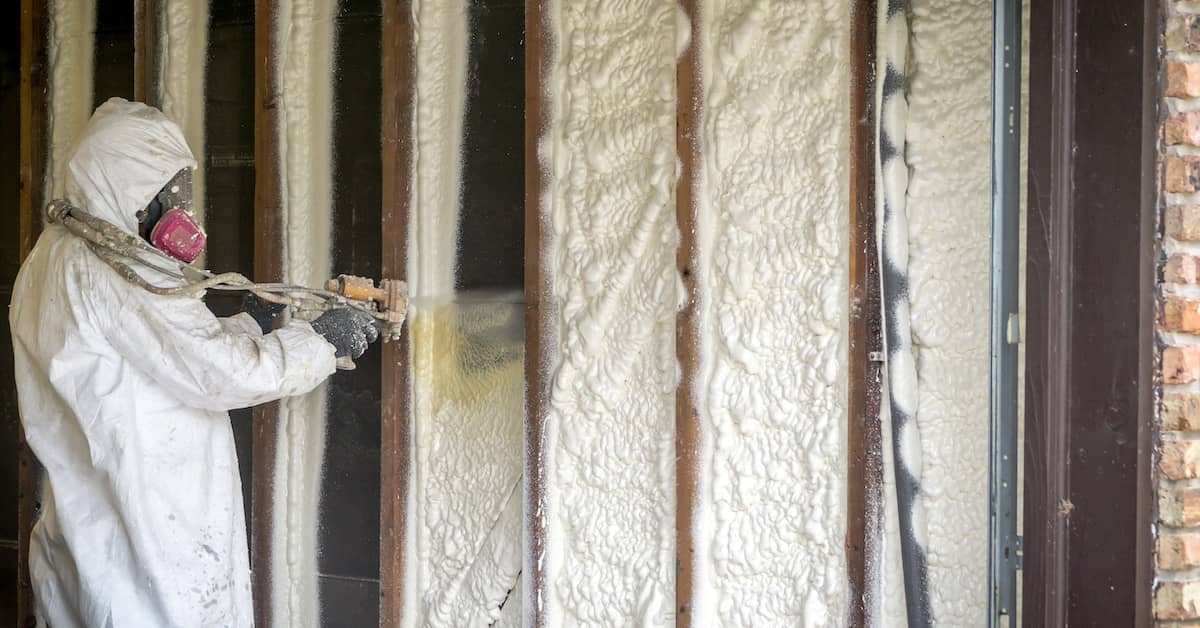
What Is Closed Cell Spray Foam?
Closed cell spray foam is a premier insulation option for houses in the Colorado Front Range. If you are looking to maximize the energy efficiency of your home, this is likely the best choice.
REenergizeCO is proud to install high-quality spray foam insulation. Although you can find closed cell spray foam kits from a number of different retailers, hiring a professional installer provides the best results and avoids many of the headaches faced by those who go the DIY route.
Please call REenergizeCO today at (303) 227-1000 in Denver or (970) 323-3191 in Fort Collins to discuss your insulation options. Or you can keep reading to learn what closed cell spray foam insulation is, how it works, and what it can do for your home.
What Is Closed Cell Spray Foam Insulation?
As the name implies, spray foam insulation is a material that is sprayed into the spaces of your home to create a thermal barrier. It is usually made of polyurethane, a plastic material with a wide range of applications.
Polyurethane spray foam comes in two different forms: closed cell and open cell. The “cells” refer to small bubbles that form when the spray foam is applied. With closed cell spray foam, the cells become encapsulated (fully closed). This creates a rigid, impermeable layer through which air cannot pass.
How Does Closed Cell Spray Foam Work?
Foam insulation expands as it is sprayed. It consists of two separate chemicals (Ex: polyol and isocyanate are used in polyurethane spray foam) that are combined when they travel through the spray gun. When it is sprayed onto a surface, closed cell foam immediately starts to expand anywhere from 20 to 30 times its initial size. It cures rapidly, creating a seal about 1 inch in thickness.
Closed cell spray foam has the highest R-value of any insulation material. The spray foam we use is rated approximately R-6 per square inch, meaning it is extremely resistant to heat transfer.
One of the primary uses for closed cell spray foam is insulating the attic. It can also be applied in other areas such as interior walls, the basement, and more.
How Is It Different from Open Cell Spray Foam?
The small cells in open cell spray foam remain open when the material is applied. As a result, open cell spray foam is more flexible than its closed cell counterpart.
Open cell spray foam expands more than 100 times its initial liquid size. The higher expansion rate results in a barrier that is thicker than closed cell spray foam: 3 square inches compared to 1 square inch.
Unfortunately, thicker does not mean better insulated. The permeability of open cell spray foam results in a lower R-value. Professional insulation contractors can achieve higher R-values with multiple applications, but closed cell has a decisive advantage when it comes to achieving maximum R-value with a single, continuous application.
What Are the Benefits of Closed Cell Spray Foam?
Closed cell spray foam insulation has a number of advantages for homeowners. We’ve already talked about the high R-value, which is virtually unmatched among all available home insulation options. Other benefits include:
- Durability: Closed cell spray foam is long-lasting and capable of withstanding a wide range of weather conditions.
- Water resistance: Moisture is a major cause of insulation degradation. Closed cell spray foam is water-resistant, maintaining the integrity of the thermal barrier when the insulation gets wet.
- Resistance to mold and mildew: Polyurethane is an inert polymer. This makes it an unsuitable environment for mold to grow. Not only does this help the lifespan of your home insulation, but it results in a healthier environment inside your house.
- Improved comfort: No one likes a drafty house. The air-sealing qualities of closed cell spray foam provide the best protection from outside air infiltration. This keeps your home free from cold spots, drafts, uneven heating, and other issues common in houses with insufficient insulation.
Of course, one of the biggest benefits of spray foam insulation is the amount of money you save on your energy bills. The quality of your insulation has a direct impact on what you pay for electricity. Given that closed cell spray foam is the premier option for insulating a home, the upgrade in energy efficiency can lead to substantial savings!
Can I Install It Myself?
As we mentioned above, there are consumer-grade closed cell spray foam kits homeowners can use to install their own insulation. These kits use a low-pressure spray gun to apply closed or open cell spray foam to the target surface. DIY closed cell spray foam is generally intended for insulation “touch-ups,” or adding spray foam insulation to small areas.
Read More: Can You Add Spray Foam Insulation Yourself?
High-pressure spray foam is needed for more extensive insulation projects. It would take a long time to cover large spaces with DIY kits, and you would need to purchase multiple cans of spray foam to get the desired upgrade.
Professional insulation contractors have the knowledge and experience to insulate your home with high-pressure spray foam. If you are looking to cover a large area with closed cell spray foam, it is best to have a reputable insulation company handle the job.
Explore the Advantages of Spray Foam Insulation
At REenergizeCO, we are committed to helping customers in Denver, Fort Collins, and all of the Colorado Front Range make their homes more energy-efficient, comfortable, and eco-friendly. Closed cell spray foam insulation is one of the best tools we have for reaching these goals.
Contact REenergizeCO today to learn more about optimizing your home insulation with closed cell spray foam.
"*" indicates required fields


